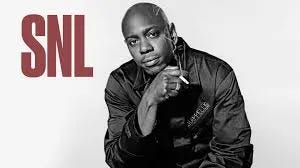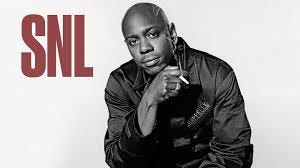CHAPPELLE’S SNL SKIT
What Dave Chappelle teaches us about ideology and the role of the church.
There’s always lots of controversy anytime Dave Chappelle shows up on stage. His SNL appearance after the November midterm elections was no different (See it here). He engages culture issues in confrontive, controversial and often offensive ways. But before we dismiss him too readily, I’d like to point out the things we can learn from him, especially if we’re Christians seeking to engage culture.
On The Normalizing Effect in Culture
He riffed on many things, but it was his riff on Kanye West, now known as ‘Ye,’ that drew the most ire. Chappelle was accused of normalizing, perhaps even popularizing, antisemitism by Anti-Defamation League CEO Jonathan Greenblatt and others. Chappelle said stuff like there’s “a lot of Jews in Hollywood” and so “if you had some kind of issue, you might go out to Hollywood and start connecting some kind of lines and you could maybe adopt the illusion that Jews run show business … It’s not a crazy thing to think,” he said. “But it’s a crazy thing to say out loud.” Anyway you look at it, Chapelle’s tropes walk a fine line. But when you string together lines that stereotype Jewish persons, and make it a joke, you can easily understand how people, especially Jewish persons, would be upset.
And rightfully so! We’ve been through the normalizing, justifying, giving people an excuse to ‘racify’ persons, encouraging racism in this country the last several years led by a former president. We’ve watched alot of people, including Republican politicians and white evangelical people who voted for him, just dismiss this normalization of racism as nothing. And this normalizing of racism has heaped much abuse on already abused racialized minorities and immigrant populations in this country. Our country has become a toxic society because of it. It’s unacceptable. And so the first reaction to Chappelle is and should be a chastising of him for his encouraging of racism.
So we all agree on this.
On the Ideologizing Effect in Culture
My guess is that Chappele does as well. So is there is something more going on here that will be missed if we just focus solely on the normalizing effect of Chappelle’s riffs on anti-semitism? I say ‘yes.’
What Chappelle does regularly on that national stage is expose the deep antagonisms that run beneath the surface of our everyday cultures that get policed out by the current ideologizing discourse. These antagonisms never get talked about because they regularly get policed out and dismissed by the ideological forces. And so, what Chappelle does, in a dangerous way that throws caution to the wind, is say things you’re not supposed to say. He complexifies them. And dares you to have a deeper conversation with people actually struggling with the issue. For Chappelle, his modus operandi is summed up in the closing words of his monologue: “it shouldn’t be this scary to talk about anything.”
In most public discourse, you’ll notice that when you mention an actual real story about racism(s), that fit the prejorative sterotypes, you’ll get accused of things like normalizing. If you’re a black person, and talk about an occasion of being mistreated by Jewish persons in a financial services center, you’ll be accused of antisemitism. If you’re a black person talking about being mistreated by the police, there will be white people that talk about black on black crime and support law enforcement at all times. Any actual realities on the ground will be dismissed, never get discussed or challenged or reconciled. The actual interpersonal engagements will get lost. The ideologies will take over and enable the racism to keep on going. There will be no changes. Power will be sustained. It is the ideologizing effect.
It’s the way those in power keep their place of privilege, including the white elitest policing groups which feel good about their anti-racism, but in fact live their everyday lives profiting off the socio economic circumstances that sustain themselves and the racism. It’s the ideologizing effect. Dave Chappelle got up in front of millions and dared to suggest we talk about it.
Chappelle exposed the underlying social realities driving the Trump phenomenon. He resisted doing the easy thing: just destroy Trump and insult all who support him. Instead, Chapelle talked about his Ohio neighbors - poor white people - and described the appeal of Trump to these people. He’s an “honest liar … No one had seen anyone come from inside that house and say to the commoners – “we are doing everything you think we’re doing” and then go right back into the house and start playing the game again… and a star is born.” Because for Chappelle it’s all about the ruse being exposed. The white elite people are playing this game, and the people policing all this talk are part of it. And so yes, Chapelle comes dangerously close to normalizing antisemitism by saying there might just be something here to look at, the treatment of black persons by Jewish folk, but he’s willing to do it, to expose the way the ideologizing effect works. Ouch!!!
The Black Barber Shop Skit
This all reaches a crescendo in an SNL skit towards the end of the show evidently written by him and his writers. Evidently half of SNL’s writers resigned from working on the show that night in protest of Chappelle’s appearance. The skit (see it HERE - really important), written by Chappelle and his writers, follows a conversation in a Black Barbershop where real life is being discussed around a number of topics. With each topic, there’s a lone white barber making comments revealing his politically correct opinions on everything from the vaccine, to the president of the United States, to yes, the state of relations between black people and Jewish people in the neighborhood. The skit powerfully depicts everyday life conversations in a black neighborhood, the nuances, what people are thinking about struggling with in an actual black neighborhood. For Chappelle, the black barbershop symbolizes the place of conversation and real life. The white barber continually misses the nuance. He represents the well policed politically correct Anti-racist discourses that take place above the flow of everyday life. The skit illustrates the ideologizing effect to a tee.
The skit, if you can watch it twice, reveals how the actual work of justice gets side tracked in our culture by ideologizing. It shows how, in the current ideologizing culture, most of what passes for Christian justice work, is affluent Christians (mostly white, but many times non-white people living in affluent white spaces) trying to educate people who disagree with them on whiteness/white supremacy/white privilege, all the while staying above the fray of the actual justice work on the ground. It is why so little changes in our culture.
Let me say clearly, educating white people is important. But it only goes so far. Whiteness, white privilege and racism supports the exploitation and privilege that backs the economics that keep white people in comfort. I, Chappelle, most people reading this, can all agree on this.
But educating white people about that racism doesn’t really change anything until we expose the actual antagonism and exploitation on the ground, and the systems that most of these educators are benefiting/profiting from while they are doing the educating. And so this has created an industry, a social media industry, a consulting industry, a DEI corporate training industry, all of which stays above the fray, does not affect the socio-economic structures that are inhabited and maintained by the social justice activists, and perpetuated by the racialized antagonisms they keep going to keep their own egos and coffers full.
Dave Chappelle’s monologue on SNL exposed this part of the American social justice discourse. Ideologized, antagonized, policed according to the political elites on both sides, we never get to the actual on the ground injustices, exploitations, misogynies, patriarchal abuses. We just stay above the fray in our social activist echo chambers, making money, staying safe in our affluence, never touching the racist structures that benefit from all this. We never talk about actual stuff going on, actual feelings, actual wrongs, actual injustices. We’re too busy policing ourselves. This is why, again, Chappelle closes off his monologue by saying “It shouldn’t be this scary to talk about anything.”
Chappelle and the Church
I know and recognize that Chappelle has offended many many people. He has played loose with language and comedy around the lives of struggling trans persons. He comes dangerously close to normalizing antisemitism. He’s dangerous. But let us not ignore the bear Dave Chappelle is ever trying to poke. I contend there’s a lesson here from Chappelle to the church.
The United States is a country that needs spaces like the black barbershop in the SNL skit. We need places where people can come together, be together, talk, converse, pray, discern. We need to be spaces that can disrupt the ideologizing, where actual stories can be heard, the gospel can be proclaimed, repentance, lament, and inter-relational transformation can happen and take place within and among the systems that are so locked into injustice via the ideologizing effect. We need to be educated on the blind spots of racisms, the history that has created our systems of inequity and abuse, but we need more than this. Because once this education goes to ideologizing all is lost. I’ve written a lot about this in previous books. I won’t repeat myself.
When the church becomes the politic making space for these conversations, Jesus can be recognized as present. We bring the powers of reconciliation and healing released in the person and work of Jesus, made real by the Spirit. We, in essence become the presence that breaks the logjams of ideologizing: the bear that Chappelle keeps poking. Can we become these people? Can we be this presence. Can this be who we are. I think so. It is who we are who so choose to live under Jesus is Lord and allow His Kingdom to take shape amidst our lives.
On these issues, I ‘ve learned a lot from these books:
Cedric Johnson The Panthers Can’t Save Us Now
Jonathan Tran Asian Americans and the Spirit of Racial Capitalism





I think you and Dave C. are both people who provoke people into daring to face thoughts they try not to, by method, and I see why you therefore admire and recommend his work. You, on the other hand, are far more kind and gentle than he, so the similarities cease pretty quickly. He deliberately gets people's blood boiling in order to make them see what they hide from themselves as they lose control of their formerly restrained undercurrents of (whatever: racism, privilege, etc.) You on the other hand deliberately try to forestall those emotions, try to keep people from reacting in anger (even in your FB introduction/invitation to look at this you do that, preemptively cooling the process if possible). Interesting to note. If we were to triangulate to a third way of doing the desired outcome of making people face what people are unwilling to face, different from either you or Chappelle but in this case making them laugh (at themselves, in spite of themselves) and thus migrate towards a different pov, it would be Dick Gregory. Dude was a freakin' genius at it.